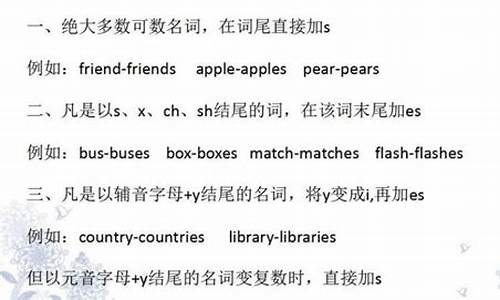句子复数用英语怎么说单词_句子的复数用英语怎么读
1.英语句子变复数,怎么做,谢谢!
2.怎样判断英语句子中的单复数
3.在英语里面怎样把单数形式的句子改为复数形式
4.英语句子中的单词为什麼要变复数?什麼时候变复数?
5.把英语单词变成复数时什么时候加s什么时候加es?

有3种原因。
一、复数。
有些可数名词比如le,computer等等都是可数的。
例:I buy some les.?
一般人们买苹果会买好几个而不只是一个,所以当可以数的东西被写在句子里。且在句意中它不止一个就要加“s”表示有不止一个(一般加在名词上)。而如果只有一个苹果,可以说I buy an le.
二、第三人称单数。
当句子中的主语是单数的话,这个句子中的动词后面需要加“s”。
比如He buys some les. She buys some les. Everyone buys les.
主语“he”“she”“everyone”都是单数,所以动词buy后面加s。
如果主语是"we"“they”“people”这种复数的名词(三个词都是不止一个人的意思“我们”“他们”“人们”)后面动词就不用加s。
例如:We buy some les。
三、所属格。
当句子中讲的某样东西属于这样东西前面的那个单词,则前面的单词要加s,但不是直接加。
比如:这是Mary的苹果:This is Mary's le.?
苹果属于Mary,所以Mary名字后加‘s。
注:s前要加一撇。但如果前面的单词以s结尾,作为所属格它不用加s,在单词结尾加一撇就行。
比如:three persons' gift. 表示三个人的礼物。
扩展资料:
第三人称单数除+s外别的方法:
首先,要搞清楚第一、第二、第三人称各是什么。第一人称就是“我”和“我们”。第二人称是“你”和“你们”。第三人称单数是“他”、“她”和“它”,复数则是“他们”、“她们”和“它们”。
1、大多数实义动词在词尾加“s”在清辅音后发音为/ s / ;在浊辅音及元音因素后发音为 / z /。
如speak→speaks / s / ; come→comes / z / ; play→plays / z / 。
2、以辅音字母加“y”结尾的动词,要先将“y”变为“i”然后再加“es”读/ iz /。?
如study→studies / iz / ; fly→flies / iz /。
3、以“s、x、ch、sh”结尾的动词在词尾加“es”发音为/ iz / 。?
如teach→teaches / iz / ; watch→watches / iz /。
4、以“o”结尾的动词,在词尾加“es”。 常出现的两个以“o”结尾的动词go和do后加“es”读/ z / 。?
如go→goes / z / ; do→does / z /。
英语句子变复数,怎么做,谢谢!
1....schoolbags are...(table应该不需要吧不然读起来太奇怪了)
2....butterflies are ...(grass应该也不要吧)
3.They are policewomen
4These are red parks
怎样判断英语句子中的单复数
1.these are our books.
2.those are their families.
3.they are french.
4.we are students.
5.they are hairdressers.
6.are these lily's pens
7.are those your friends cars.
8.they are their dresses
9.what are your jobs
10.our shirts are blue
11.whose shirt are those
12.they are same color
遵循规律 this变成these that 变成those her his 变成their he she 变成they is 变成are does 变成 do 其他一般名次直接加s就好
在英语里面怎样把单数形式的句子改为复数形式
主要看句子的主语和谓语。
主语如果是复数代词we,you,they,these,those或有复数名词(通常有s词尾),句子就是复数。
主语如果含有both...and...,句子就是复数。
......
谓语部分,如果助动词是are,he,were,*do,或谓语动词是be的are形式,句子就是复数。
......
关于这个问题,最好还是看看语法书上有关主谓语的一致问题。
*****************************************************
主谓语的一致:
1、主语和谓语基本保持单复数的一致,即:主语是可数名词单数或不可数名词时,谓语动词用单数形式:
The computer was a great invention. The water in the glass is very cold.
2、集体名词(如family, class, team, group, row, police, school等)做句子主语时,
① 如果表示整体概念,则谓语用单数形式,如:Class Three is a very good class.
② 如果表示其中的所有成员时,则谓语用复数形式,如:Class Three he a map of China.
3、Chinese,Japanese,fish,sheep,people等表示单个时谓语用单数,表示许多时,谓语用复数。如:
There is a sheep in the yard. / There are some sheep in the yard.
4、maths,news等虽然有s结尾,但不是复数,因此谓语仍用单数:The news is very exciting.
5、glasses,shoes,socks,trousers,gloves等名词往往用复数形式,故谓语用复数。如:
The trousers are very cheap and I want to take them.
6、a lot of 后跟名词复数时谓语用复数形式,跟不可数名词时谓语用单数形式。如:A lot of students are playing baseball now. A lot of time was wasted on that work.
7、and 连接两个名词做主语时,谓语原则上用复数,但是两个名词若构成一个整体事物时,谓语则用单数。如:The teacher and his son are picking les now. Fish and chips is very famous food.
8、 there be 句型中be的单复数一般由靠近的名词决定。如:There is a table and four chairs in the room.
9、用both…and…连接两个事物做主语时,谓语一般用复数。如:Both you and I are required to be here tomorrow.
10、主语中含有with的短语时,谓语单复数由with之前的人物决定。如:A woman with a 7-year-old child was standing at the side of the road.
11、either…or…或者 neither…nor…连接两个人物做句子主语时,谓语用就近原则。如:Either you or he is right. / Neither you nor I am going there.
12、表示一段时间或长度概念的复数名词做主语时,谓语一般用单数。如:Two months is not a short time. Two thousand kilometers is quite a long distance(距离).
13、主语中含有half of… / (three quarters)of… / all (of) the ….等词语时,谓语的单复数由名词确定,如:Over three quarters of the information on the Internet is in English. / A third of the students were playing near the lake. / All of the water in these rivers has been polluted.
但是,population一词又有特殊情况: What’s the population of China? / Three quarters of the population in this city are Arabs(阿拉伯人).
英语句子中的单词为什麼要变复数?什麼时候变复数?
把谓语动词改为复数,和后面的名词改为复数(就是宾语)还有就是在单数形式里面可能有a,那就要改成some/many/a lot of.
如:We'd like a glass of milk.(改为复数形式)
We'd like some glasses of milk.
把英语单词变成复数时什么时候加s什么时候加es?
英语句子中的单词为什麼要变复数?什麼时候变复数?
可数名词一般当数量在一个以上时用复数,不可数名词不用复数
英语句子中单数变复数主语的人称也变复数吗你是说人称代词吗?
比如说,I 的复数就是we, you 还是you
举例:
I love you(我爱你)
we love you(我们爱你们)
英语句子变复数They he (some) blue T-shirts.
英语句子单数变复数They he round faces
take notes中的note为什麼要变复数
固定片语。可以理解为所做的笔记不能只有一笔或一个字母,所以为复数。
子音+y变复数英语句子strawberry
草莓
复数
strawberries
以子音加y结尾的单词变复数,把y变i加es。
例句
I like strawberries .
我喜欢草莓。
满意请纳。
英语句子变复数 人称变化吗具体问题具体分析.For example, she is a pretty girl. They are pretty girls.
There is a desk. There are some desks.变化啊~!
比如She has a pen.
They he pens.
bone骨骼为什麼要变复数?在句中我怎麼觉得是,如果是中文的话,你也会说一根骨头两根骨头啊。。。
所以就有时候用复数啊。。。
当主语是单数第3人称时,动词加s
比如He reads book.
当动词以s,es,th,sh,o结尾时,动词应加es
比如He goes too fast.
当句子是现在进行时时,动词加ing
如:He is reading book.
第三人称单数后面动词要加s,动词结尾是ch,sh,x,s的时候加es,比如
"reach"就加es变为"reaches".还有一些不规则的动词,就不一一列举了.
例句:
I read a book.
He reads a book.就是这个区别.
在be动词后面要加ing,还有一些其它的规律.
例句:
I am reading.
He is reading.这时候第三人称单数没有区别.
其它的一些规律:
I see a boy reading a book.
I finish reading the book.
I like reading.
第三人称一般现在时用S吧
es一般ch,sh,x,s是以es作名词复数,动词的话要根据动词最后音调判断,如果是辅音一般不用,如果是助音用es不过也有例外的~
ing形式是动词变动名词用
Ex:He likes reading.
或者现在时使用
EX:He was reading the book when i came in.
动词+S/ES:在主语是第三人称单数的情况下
动词+ing:1:在进行时态中 be+Ving
2:做名词用时 常出现于介词后
声明:本站所有文章资源内容,如无特殊说明或标注,均为采集网络资源。如若本站内容侵犯了原著者的合法权益,可联系本站删除。

